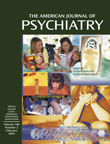Older Patients With Schizophrenia: Nature of Dwelling Status and Symptom Severity
Abstract
OBJECTIVE: This cross-sectional study enrolled elderly patients with diagnoses of schizophrenia or schizoaffective disorder. METHOD: The 85 subjects were dichotomized into two groups on the basis of dwelling status: those living independently (N=35) and those living in residential settings (N=50). The groups were compared with regard to scores on the Mini-Mental State Examination (MMSE), the Brief Psychiatric Rating Scale, the Scale for the Assessment of Negative Symptoms (SANS), the Geriatric Depression Scale and by age. RESULTS: Patients living independently had significantly higher MMSE scores, lower SANS scores, more years of education, and were younger than the patients living in residential settings. CONCLUSIONS: These data suggest that although cognition, negative symptoms, and age are important discriminators with regard to dwelling status, cognition and negative symptoms appear to have the strongest impact.



